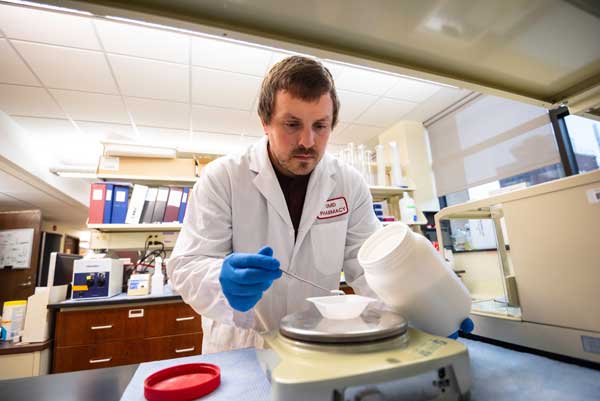The College of Pharmacy offers degrees in the programs of pharmacy (PharmD, MS, PhD), occupational therapy (OTD), and medical laboratory sciences (BS, Certificate, MMLS, MS, and BLS).
The pharmacy program is offered on the Twin Cities and Duluth campuses. The occupational therapy program is offered on the Twin Cities and Rochester campuses. The medical laboratory sciences program is offered on the Twin Cities campus. Interactive technology is used to keep all campuses connected.
Vision
- Nurture exceptional and visionary pharmacy thought leaders rooted in a culture of excellence and innovation in education, research, practice and community engagement.
- Provide a dynamic educational experience to a high-achieving, diverse student body, thus empowering them to become leaders in patient-centered, interprofessional care.
- Lead innovative research in pharmaceutical sciences and patient care through embracing the value of interdisciplinary work.
- Cultivate relationships with patients, decision makers practitioners, and other key stakeholders to meet changing needs, model patient-centered care, and shape the evolving health care system.
- Prepare graduate students, residents and post-doctoral fellows to become the next generation of scientists, advanced practitioners and educators.
- Foster a culture of inclusivity that attracts and retains an outstanding and diverse faculty and staff.
Values
With community as our cornerstone, we assume shared responsibility and accountability for creating a healthy and caring organization dedicated to serving others through education, research, practice, and service.
Diversity & Inclusion
- Include all perspectives equally, whether present or absent.
- Create a safe environment for all to share ideas and perspectives.
- Be open to new ideas and perspectives.
- Demonstrate a collaborative spirit.
- Celebrate our differences and similarities.
- Advocate for visible representation.
- Advocate for social justice.
Integrity
- Behave honestly, responsibly and equitably.
- Hold each other accountable
- Assume positive intent, unless demonstrated otherwise.
- Contribute to an environment of trust and respect.
- Align individual interests with University and collegiate priorities.
- Ethically conduct our work.
Excellence
- Continually challenge ourselves personally and collectively.
- Commit to professional development of self and others.
- Be accountable.
- Play to your strengths.
- Collaborate to achieve greater impact than we can alone.
- Commit to serving others.
Joy
- Align passions and strengths to create purpose in work.
- Bring enthusiasm and positivity to daily interactions.
- Practice kindness and empathy.
- Celebrate accomplishments and successes.
- Create ongoing opportunities for fun.
Curiosity, Creativity & Innovation
- Be inquisitive.
- Pursue possibilities.
- Stimulate ideas through networking.
- Take and support strategic risks.
- Challenge the status quo.
Tackling Society’s Toughest Healthcare Problems
Since our founding in 1892, the University of Minnesota College of Pharmacy has improved the health of Minnesotans and people around the world through innovative education, pioneering research, and interdisciplinary practice development.
Our faculty, staff, students, alumni and partners work together to shape the field of pharmacy, accelerate innovations in education, drug discovery and development, healthcare, economics and policy, pharmaceutical care, medication management and progressive practice.
Research Activities
Our researchers are on the leading edge of finding ways to solve some of the world’s greatest problems in areas such as:
- Drug discovery and development
- Pharmaceutics and drug delivery
- Experimental and clinical pharmacology, including personalized medicine
- Neuroscience
- Cancer therapies and chemoprevention
- Geriatrics
- Pharmacy management and economics
- Healthcare outcomes
